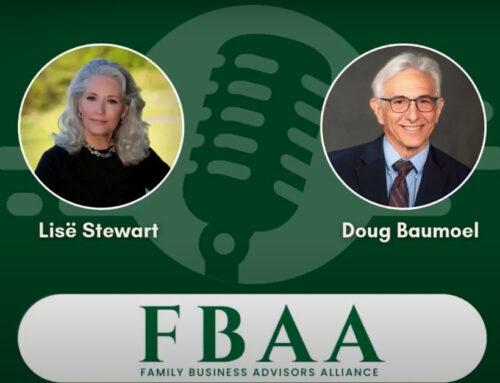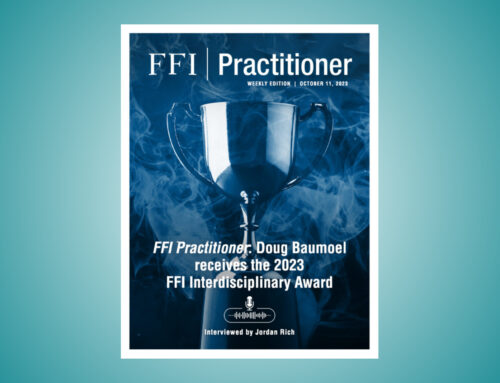Webinar: Understanding and Managing Conflict in Enterprising Families
Watch this webinar recording about managing conflict in family enterprises. Doug Baumoel, founder of Continuity and co-author of Deconstructing Conflict, reveals what truly drives entrenched, emotional disputes in family businesses. He debunks myths, explains key differences between conflict types, and shares how to match the right professional support to the problem—all grounded in over 20 years of experience guiding families through tough transitions.
Key Takeaways:
- Learn Common Myths About Conflict: Doug dispels popular but harmful beliefs—like “conflict is good”—and explains why many common approaches actually backfire in family enterprises.
- Understand the True Nature of Conflict in Family Enterprises: Learn the difference between disagreements, disputes, and identity-based conflict—and why the latter is especially destructive and emotionally charged.
- Understand the Role of Support Professionals: Learn how mediators, psychologists, consultants, litigators, and coaches can each help—or hurt—depending on the situation and the type of conflict at play.
- Discover Conflict Management Approaches: Explore how families can build trust, strengthen their shared purpose, and use personal and structural development to grow out of conflict.
David Shaw (00:00:23):
Welcome everyone, and thank you for attending today’s webinar. I’m David Shaw, the publishing director for Family Business Magazine, and I hope that you and your family members are all well and getting ready for summertime. Conflict is inevitable in any business, but in family enterprises, it can be uniquely complex, deeply personal, and surprisingly misunderstood. I hope that today’s session will dispel persistent myths about conflict, reveal what truly drives conflict, and offer a framework for understanding and addressing conflict constructively. This webinar will try to identify the difference between a disagreement and a deep rooted dispute and discuss when and whom to call for outside help. Should be a fascinating discussion today. Before we get started, our housekeeping details for our webinars. If you haven’t joined us before, or even if you have, please know, we welcome your comments and questions throughout the session. You can use that ask a question bar that’s right underneath, uh, the screen there. We’ll go for no more than 60 minutes today and get to as many of your questions and comments as we can. Now, I’m pleased to introduce our speaker today. Doug Baumoel is an expert on the topic of conflict in family companies. He’s the founder of Continuity, family Business Consulting, and the co-author of Deconstructing Conflict: Understanding Family Business, Shared Wealth and Power. That’s a book that I highly recommend for all family business members. So, uh, welcome Doug. It’s great to have you with us.
Doug Baumoel (00:02:04):
Thank you. Thank you, David. Pleasure to be here.
David Shaw (00:02:08):
Yeah, I will come back on with questions from the audience. Uh, take on over.
Doug Baumoel (00:02:13):
Okay, so, uh, yes, um, where are we on the slides? Yes, so, hi, uh, so I’m Doug Baumoel. Thank you all for attending today’s talk. Um, like many of you, I grew up in the family business, but I hope that unlike many of you, um, mine had a lot of conflict over the course of about 15 years. My family worked with several family business consultants, psychologists, mediators, coaches, the works, many of whom made actually, actually made matters worse, not better. We eventually ended up in that death spiral of litigation and we hired lawyers, um, and our wonderful company was sold through, uh, through the courts at a significant loss of wealth for our family and, um, a situation that split the family for about a decade. Um, so about 25 years ago, uh, when I was coming out of that situation, I started continuity, uh, and I started continuity to take what I learned from that experience, to build a practice that would help families deal with what I consider to be the biggest existential threat to not only their businesses, but their families, and that existential threat is poorly managed conflict.
Doug Baumoel (00:03:31):
So, in our hour together today, I am gonna give you some insights into family business conflict. Uh, we won’t, uh, be able to go into a, an exhaustive training on how to manage conflict, but I will talk about two primary, uh, and very important ways to manage conflict if you’re interested in a deeper dive in this topic. Um, I’ll talk a little bit about my book, deconstructing Conflict at the, uh, end of our talk. Alright, so I, I always begin all my talks with, uh, our purpose statement. This is why I and my team do the work that we do, and it’s that we believe every family should be able to enjoy what they have, know where they’re going, and make the most of their lives together. Uh, and it should be the reason why you are all here today, why you work together, and why you share ownership and certain assets. Um, this should be your, I think, should be your purpose statement as well. And this is why conflict is such a crucial central, uh, and important topic. It’s because when families are in conflict, they don’t enjoy what they have. They’re typically in conflict about where they’re going, and they certainly can’t make the most of their lives either individually or together.
Doug Baumoel (00:04:51):
So yes, clicking the slide forward. Um, so this is our agenda for today. We’re gonna talk about something I call the spectrum of difference. I’ll explain what I mean by that. We’re going going to explore some, uh, myths about conflict. I’m gonna detail some of the early warning signs and some of the, the not only early warning signs, but the apparent signs that folks are, have entered into that zone where conflict exists. And then, as I said before, we’re gonna talk a little bit about two of the primary approaches that are, that are useful in managing this type of conflict.
Doug Baumoel (00:05:30):
So I mentioned this word, the spectrum of differences. It sounds like something of, uh, the next bond movie, but actually it’s, um, it’s this graph to the left. And so take a look at it. Uh, the shaded areas show how differences escalate from simple disagreements through dispute into conflict and beyond in increasing intensity. The horizontal axis indicates the degree to which differences are personal or substantive about the, the issue, not the person and the vertical, uh, axis indicates if differences are isolated or systemic, sort of built into the fabric of the, of the company or the shared assets or the, or the family, or they systemic or they sort of isolated. So if we begin it with, um, disagreements, that’s where differences often start. Disagreements are healthy. Uh, people learn from disagreements, they argue, and they often find more interesting and effective solutions to problems.
Doug Baumoel (00:06:32):
They also have an opportunity to explore each other’s thinking, each other’s values. And a simple disagreement is usually an isolated instance. It’s not connected to a variety of other issues that might be going on. So when a decision is reached regarding a disagreement, a simple disagreement, it typically doesn’t come up again. It doesn’t resurface disputes are a little bit different. They’re more extreme. Uh, they might be more, um, systemic. They, they might be connected to more things that are going on, but they’re typically a little more personal. People’s, um, egos are wrapped up in their dispute. They’re more complex, uh, but they, the addressing disputes can be done in isolation. You can the, in fact, that’s how they’re defined. A dispute is something that you can isolate and, uh, and resolve. Typically, you resolve disputes through negotiation. Uh, but sometimes, and sometimes people resolve disputes through force.
Doug Baumoel (00:07:41):
Using force can be expedient. A CEO can fire a subordinate, even if it’s a family member, a board member, a board can out vote a family branch or a family member or an executive. Uh, and what is also too common, adult children can prevent their parent from seeing their grandkids unless they get what they want. So obviously using force as a mechanism, as an approach to manage dispute has a, has a serious downside. And the downside is it can potentially trigger additional conflict, additional disputes, or escalate dispute into that conflict zone. A conflicts are very different. They involve issues either substantive or personal, or typically a combination of the two that are not only important, they’re sort of existential to each to the interests of each of the stakeholders. And when they’re both systemic, meaning that they’re sort of built into the system, they involve issues that keep coming around, that keep popping up or related to other issues that keep popping up.
Doug Baumoel (00:08:49):
So when they’re both systemic and they involve deeply personal issues like, uh, like respect what you believe, what you value, we get into the realm of identity based conflict. And it’s this identity based conflict is that is what kills businesses and destroys families. So poorly managed identity based conflict also leads to cutoffs. And why are cutoffs so damaging to families? Because they teach the next generation that family is disposable when conflict occurs. That’s why we rarely see a single cutoff in a family that we work with. So typically, uh, most family business consultants will map out, one of the first things we do is we would map out the family tree. So we know the history of the family, going back a couple of generations, and we understand, you know, who’s on the playing field today and who might be on the playing field next, in the next generation.
Doug Baumoel (00:09:48):
We call that a, uh, that family tree. We call it a genogram that allows us to put additional notations about certain relationships, uh, and other things that are important. When cutoffs occur, they occur typically in, in every generation. Um, we rarely see just one. And think about it, if I no longer speak to my father due to a conflict, it gives my children permission to do the same to me when they have a conflict with me. If I no longer speak to my brother, sister, cousin, that models for them how they can treat each other when they have a conflict. And that’s poison for a family. So like other ailments and afflictions in a family, alcoholism, uh, certain genetic issues, when we see cutoffs, we see them flowing through because it’s learned behavior, it’s modeling for that next generation, and it’s poisoned for a family. So I, I mentioned this concept of identity based conflict. So let’s dig into that a little bit.
Doug Baumoel (00:10:56):
So we all have a sense of who we are and our place in the world. Like this cat sees sort of an over inflated, inflated, uh, sense of self maybe, and that when he looks into the mirror, he sees a lion. Uh, we have a sense, we all have a sense of our own competencies, our talents, our skills, our values, and we see ourselves as having integrity. We see ourselves as rightly serving in certain roles, doing certain jobs. And these are characteristics that define us. The trouble comes in when others see us differently than we see ourselves.
Doug Baumoel (00:11:33):
Hello, advancing the slide. Yes. So for example, in, in sort of a, a little trite example, in, in, um, in this graphic, the black cat sees the, uh, orange cat, not as the lion, but they see him as the self-important entitled, uh, uh, manager or leader or, uh, or not. Um, in the same way, uh, another stakeholder might see that they were the, the cat in this case as a conniving, secretive, uh, untrustworthy rat in that case. And what happens when people see us differently than we see ourselves is that our amygdala gets triggered. We enter our fight, flight or freeze brain, and our rational thinking gets hijacked. We react emotionally and typically extremely emotionally. And the thing about identity based conflict is that our identity is not negotiable. It’s who we are. It’s how we define where ourselves, and we’re not gonna negotiate that.
Doug Baumoel (00:12:40):
Therefore, mediation. If you think about what mediation is, mediation is a facilitated negotiation process. It’s not applicable for con for this type of family business conflict because it’s a negotiation technique. And if you think about, um, communication and, uh, all the, all the, uh, effort and attention that’s put on having good communication, simply communi, communicating better about why another stakeholder thinks I’m not worthy or smart enough for a particular role or position in the company, that’s not gonna be very helpful. So these approaches an over focus on, well, you have to communicate better, or let’s call an a mediator, these can actually make matters worse because they don’t address what’s really going on. So in this perspective, that conflict is conflict in family businesses, identity based conflict. I learned that conflict and family enterprise has more in common with other types of identity-based conflict. And those are religious, political and ethnic types of conflict.
Doug Baumoel (00:13:50):
So solutions to managing family business, conflict demands, looking beyond approaches that work for simple civil dispute and requires approaches taken from these other fields, the field of ethnic, religious, political type of conflict, um, that have, that have been developed for those types of, of identity, identity based conflicts. Um, and when I, uh, I learned this, what I was trying to understand those many years ago, before I started continuity, I was trying to understand why my family and my family business failed due to conflict. And more importantly, why the advisors that we hired were not helpful and often made matters worse. And I studied everything I could find on managing conflict and found that the lessons from these other fields, these the ethnic, political, religious fields, were much more applicable than what I was learning from, um, from the dispute resolution literature. Alright, right. So let’s talk about, about conflict for a minute.
Doug Baumoel (00:14:54):
And I’m sorry, the common myths about, about conflict, the first myth that I always hear is that conflict is good. I hear this all the time, um, conflict. And let’s be very clear, conflict is never good. It should always be avoided. When people say conflict is good, they’re talking about disagreements. And disagreements are often very good. Think about it, think about it this way. So disagreements are like the cuts and bruises that we get as kids when we’re learning new skills, when we’re learning how to play a competitive sport, when we’re learning how to ski, et cetera. They’re inevitable cuts and bruises, they’ll heal and we come out stronger, we learn new skills, and we’re better for it going. Uh, and if you think about that, um, spectrum of difference going up a level to disputes, well, disputes aren’t fun, that’s certainly true. But when they’re properly resolved, they’re sort of like the broken bone that can heal back even stronger.
Doug Baumoel (00:16:00):
Families that go through a significant dispute end up learning more about the issue, the underlying issue of the dispute. They end up learning more about each other, what they value, how they, how they communicate, et cetera. And in addition, they’re likely to pick up dispute resolution skills along the way when it’s resolved. Well, conflict is a very different animal conflict is, if I’m making the, if I’m extending that analogy, conflict is like cancer and there’s no good cancer. Nobody would say that cancer is good in any form. Conflict has happened. Conflict happens when, uh, disagreements and disputes, metastasize decides conflict, leaves scars, it damages businesses, and it needs to be avoided. It also needs to be properly managed. And when it happens and when it’s properly managed, there also needs to be a healing process. But make no mistake about it, conflict can be managed. And we’re gonna be talking about that in a couple of slides.
David Shaw (00:17:03):
Doug, a a quick, quick question for you because, uh, the, the idea of a lot of us, and this has been noted by the, a member of the audience too, that they’ve confused disagreement with conflict. Yeah. So you’re using a much deeper definition of conflict, correct?
Doug Baumoel (00:17:20):
Exactly, exactly. It, it, it is semantic, but words matter, especially when so much is at stake.
David Shaw (00:17:28):
Okay, thank you.
Doug Baumoel (00:17:30):
The second myth I wanna talk about is, uh, sort of who are you gonna call, uh, when faced with conflict stakeholders and advisors often believe that there’s a singular correct and appropriate approach that can solve the, the problem at hand. And they often call or recommend a professional with one of these singular skill sets. Um, let’s go back to that spectrum of difference, starting with disagreements. So disagreements do respond to perhaps those singular skill sets. Disagreements can respond to calling in a content expert, um, who’s an expert and can provide an independent opinion about the thing that you’re in disagreement about, or educate both parties, uh, uh, about those topics, um, that are underlying the, the particular disagreement. Disagreements also respond to communicating better. So, better communication is certainly better than poor communication. Uh, but when stakeholders can more clearly articulate their position and do so in the learning style or the communication style of the other, it can be better at resolving disagreement.
Doug Baumoel (00:18:44):
So for disagreement, I would argue that, you know, singular skillset advisors can be very useful when we, uh, enter sort of that realm of dispute. While communication work and content experts can be useful, they’re rarely sufficient, because when you’re in dispute, you can also benefit and often need dispute resolution professionals and, and a dispute resolution process that’s robust. Um, in addition to communication help and content expert help, and this dispute resolution help can involve the use of mediators, collaborative attorneys, collaborative process to help facilitate the negotiation of a settlement. I mentioned two words that some of you may not be familiar with, and that is collaborative law, collaborative attorneys, and collaborative process. We have time later, I can dig into that. It’s a wonderful approach for, um, extreme, uh, disputes that are leading into conflict. Uh, and we can talk about that later if you’re, you’re interested or you can Google it, I encourage you to do that.
Doug Baumoel (00:19:59):
Um, but it’s a great, it’s a great option for families, uh, in business together. Um, but of course I said before that force can also be used to manage disputes, but will generally trigger more conflict, lawyering up, firing people, throwing money at a problem, voting outvoting people their expedient way, expedient ways to manage conflict, but often at great cost. And, uh, with a lot of unintended consequences that can escalate conflict or escalate disputes into conflict and beyond. So conflicts though, especially identity based conflicts, need to be managed for the long term. And a multidisciplinary team with systemic identity based conflict management training, that’s what’s needed. So rather than single, uh, advisors with single skill sets that may be helpful for disagreement as conflict, as differences, advance, um, what is required are more robust teams of multidisciplinary advisors and multidisciplinary process. Uh, the third myth that I wanted to explore with you guys, um, is this myth that your family is beyond help.
Doug Baumoel (00:21:21):
You are one of those families that can’t be helped. And that’s what I heard over 25 years ago when my family was going through this by the consultants and the advisors that we hired. Family business consultants talk about families in the green, yellow and red zones, and the red being the conflict zone. And families in the red zone, they’re the ones that can’t be helped. And you’ve probably you to better articulate this, you’ve probably heard that to a hammer, everything is a nail, right? So, lawyers, psychologists, mediators, consultants, coaches who are, who are not experienced in family business conflict at this level, may believe that their singular approach should be sufficient. And when it’s not, they often blame the family. The only families that can’t be helped are the families that really aren’t families, uh, anymore. And I’ll give you an example of this. I was approached, um, several years ago by a family of very distant cousins, and they were in the process of lawyering up.
Doug Baumoel (00:22:23):
They were in deep conflict. We were recommended in, and during our initial con uh, conversations with this family, it was clear that their only connection was their shared asset. This is a family that we couldn’t help, and we did not take that case because they really weren’t a family. They were just people that were connected by a shared asset because some distant relatives, uh, made it that way. But fortunately, there is a way to gauge that family bond. And we call this the family factor, and we’re gonna talk about that in a couple of slides.
Doug Baumoel (00:23:03):
Early warning signs for, for, um, for finding conflict, uh, at its earliest point. So how do we recognize conflict? What are those early warning signs? We all know what active conflict looks like, right? It’s people fighting, it’s people storming out and yelling and threatening each other, but there’s a much more insidious kind of conflict, and that’s what we call passive conflict. When you’re in passive conflict, you, you know, when you’re in passive conflict because you’re walking on eggshells and like this game of Jenga, you become afraid of making a move, afraid of making a decision because that tower might collapse the system, the family business, the family relationships might collapse if you take action. So what do people do? They silo up, they stop sharing information, they stop making decisions together, crippling often the business, and they drift apart in their relationships. So being aware of both active and passive conflict is one way to get ahead of what’s going on.
Doug Baumoel (00:24:12):
And then there’s another framework that will help you identify when you’re in conflict. And that’s this framework that we identified certain behaviors associated with how people manage differences. And this graph, or this, uh, framework shows specific behaviors that are correlated with the importance of the underlying issue and the character of the relationship. So there, there, um, uh, behaviors associated with how people manage those differences. Okay. Um, I’ll give you an example of how we use this. Suppose that you’re buying a car and you’re trying to negotiate the price. So, so the salesman, of course, wants to sell you the car at a high price, the highest price possible, and you wanna buy the, the car at the lowest price possible. That’s the underlying set of differences that you are dealing with. And it’s crucial, at least with regard to the transaction, because that’s what the transaction is about.
Doug Baumoel (00:25:16):
It’s gonna be about the price. Um, your relationship with the salesman doesn’t really matter much, does it? So your approach to managing the diff this particular difference is to compete, you have a crucial set of differences. So you’re at the top of that vertical axis, and you’re in the middle of that relationship axis where you don’t really care much about the, um, the relationship. So that leads you to competing as your likely approach to managing that set of differences. If, however, you’re talking about taking your grandmother to dinner for her birthday, the relationship is the most important thing. And the choice of restaurant is inconsequential, unimportant to you. So you’ll probably accommodate, you’ll be in the lower right, uh, quadrant of that, of the graph of the, of the framework. You’ll probably accommodate her choice of restaurant, even if it’s something that you’d rather not, uh, a restaurant you’d rather not go to.
Doug Baumoel (00:26:20):
Now, when families are in conflict, they generally live on the left side of this, of this chart. And seeing these choices in this way is useful, and helping stakeholders, acknowledging that damaging behavior and get agreement to work towards the behaviors more on the right side of the graph, more towards that collaboration and compromise where, uh, family businesses, uh, really need to be in order to, to thrive. So we find that when families are telling us this, typically in a business setting, they’re telling us what their stakeholders, what their family members are doing. They typically talk about how they’re sabotaging them, uh, uh, again, for families in conflict, how they’re being sabotaged, how they’re being excluded, how they’re being blocked or how they’re being avoided. Uh, and identifying on a graph in black and white in front of them gives them the perspective they need to acknowledge to be more self-aware of the approaches to managing differences that they are, um, exercising and showing it in this way helps folks, um, realize that there’s a better world on the right side of this graph, and that requires work on relationships.
David Shaw (00:27:42):
Doug, before you, uh, proceed mm-hmm. You, you, that system that you just showed, you know, systematizing conflict, you take that approach throughout your book. Can you, can you give a little backstory on that? How, why did you develop this and how,
Doug Baumoel (00:27:59):
Oh, okay. That’s a, uh, I wanna make sure that we can, uh, get to the end of the deck, but that’s a long story. I’ll give you a short answer too. Uh, so when my family literally melted down, uh, people weren’t talking to each other, the lawyers just ran amok. Um, the, uh, the investment banks came in, they took apart our business, and it got sold. Uh, and the first thing that lawyers do, hopefully you’ll never enter this and experience this, but, um, first thing lawyers will do is say, stop speaking to your family members. So during this process, we couldn’t speak to each other. Uh, we tried, we had backdoor channels, et cetera, but, but it wasn’t productive. And I was encouraged by the last, the last remaining family business consultant that we had hired. I was encouraged to go into this field. There weren’t, there weren’t many people with MBAs and actual family business experience in the field at that point.
Doug Baumoel (00:28:58):
Uh, and I was encouraged to go in, and I, the first thing I thought of was why would I go into a field that I felt so poorly served by? And I thought, well, if I’m going to go into this field, I’m gonna have to approach it very differently than I experienced. And clearly I thought that the, all the advisors that we had hired did not fully understand the nature of conflict that we were engaged with, and they did not have frameworks and approaches that were really effective with us. And I thought, well, that’s, I have to learn more about this. And, um, I, if for those of you in the audience that have read our book, you’ll know that it’s based on this, this equation format. And, uh, I think, David, you are referring to that equation and how did I come up with a, an equation for helping understand the different components of managing conflict?
Doug Baumoel (00:29:48):
And the, the quick answer is this, and I’m probably spending too much time on it already, but, um, the quick answer is, I was pretty distraught when I went to my garage office and try to figuring out my next steps. And I was thinking about approaches to managing conflict. And I knew I had to figure out what went wrong with my family and our business. And why did, why were the advisors we hired unable to help. And I, my background is engineering, and I thought, you know, I have to deconstruct what went wrong. And I think like an engineer, I think about systems theory, and I remembered that, uh, during I went to Cornell and one of my favorite courses was Astronomy 1 0 2, and I took astronomy 1 0 2 with Carl Sagan, very fortunate to have done that best professor I ever had. And the point of his whole course was, if you truly understand a system, you should be able to express it mathematically.
Doug Baumoel (00:30:45):
That was the big takeaway. And he would give us examples of figuring out things, uh, and figuring out systems and applying equations. So when I was trying to figure out the moving parts to my family’s conflict, I thought in terms of that mathematical modeling, and no, we don’t come up with numbers and plug in numbers. It’s qualitative. If you’re interested in this, if this sort of trips your trigger, I encourage you to read our book. Um, and that’s how I think through pretty much everything I do with families, that it’s a system, it’s a system of conflict with known components that are interrelated in known ways that can be managed. Mm-hmm. So probably too long an answer. Should I go next slide? No,
David Shaw (00:31:28):
I think it’s, I think it’s a terrific answer. And, you know, just that inspiration from somebody like Carl Sagan is great, but also to, I mean, conflict inherently is emotional and in sprawling, and it can be a little bit of everywhere, everything all at once and a system or a framework can really, in my view, really help to deem emotionalize parts of it, maybe
Doug Baumoel (00:31:54):
Depersonalize, and allow you to, to clearly see what’s going on in the system. Yes. And yes, emotion is part of it. You can’t take emotion out of the system. You have to find a way to integrate emotion, feelings, identity into the conflict management process. And, and that’s exactly what this whole presentation is about.
David Shaw (00:32:15):
Thank you.
Doug Baumoel (00:32:18):
So how do we manage conflict? And this gets right to that point. I mentioned before, um, I mentioned before this concept of a family factor, and that as long as families care about being family, they, they can be helped. And this is our framework for understanding, uh, and being able to gauge that family glue. So the family factor is the, uh, that’s our term for it. That’s the term for family-ness. And it’s the answer to this question, is the family bond strong enough to leverage compromise, forgiveness, and a commitment to change? This is the most important thing that we try to gauge as early as possible with anybody who calls us. From the moment we pick up the phone with a potential, uh, with a prospect who’s calling us for help, our ears are, are tuned to trying to determine the strength of this family bond.
Doug Baumoel (00:33:20):
And as we work with a family, we’re constantly thinking, which, constantly trying to refine our understanding of that family bond. And we’re trying to build it. And this is the gauge that we use. We first look at shared history, and we ask the question, do family members have a meaningful shared history? That shared history might be fraught? It might contain a lot of historical impasses and grudges, but our question isn’t, is it happy or sad? The question that we ask is, is it meaningful? If it is, if it is meaningful to these families, whether they hate each other in fighting, et cetera. But if it’s meaningful, then they have something to lose by not doing the hard work of compromising, forgiving, and committing to change. I’ll give you an example. I had two cases a while back, uh, at the same time, which provided a, a striking example of, of exactly this.
Doug Baumoel (00:34:17):
I worked with two CEOs at the time from different companies, and I would go into each of their offices. And one of the striking things that that, that I saw in these offices was their, their photos of their families on their desks for one CEO. The photos were of the family together. Uh, heli-skiing, lemme see if I can remember Heli-skiing, a technical rock climbing. They were a pretty active family, uh, uh, touring Europe together. Um, what else would all kinds of activities that they were doing fishing together. Um, the other set for the other CEO, the photos were very different. They, they were, they were the perfunctory wedding photos and other staged family photos. And, um, I think you can guess which family not only had more conflict, but which had more difficulty in managing that conflict. So, just like we look at shared history, we look at shared vision, shared vision for being family in the future, when a family has a strong shared vision of being family in the future, they have something to gain by doing the hard work of compromising, forgiving, and committing to change. If a family is only staying together until the patriarch or the matriarch passes, they’re not gonna have a strong family factor. And there’s not much to leverage to, um, to, to get to that compromise, forgiveness, and change. Um, but if the family mat, uh, values family traditions, and they spend time together and they plan events together, they’re more likely to build that resilience and that strength.
Doug Baumoel (00:36:02):
So shared vision and shared history sit on this foundation of, of trust, and we think of trust very differently than you would expect. Most people think about trust in the following two ways. First is this affinity and alignment. I like you, you like me, we want the same things. So I can trust you. That seems to make a lot of sense. The problem with this is that as soon as we want different things, I stop liking you as much. And if that’s how you base this, this definition of trust on affinity, uh, how much you like the other person and alignment, how in tune you are with, with what you’re trying to do together, you’re gonna quickly get to that polarized, polarized place of, I don’t trust you when differences occur. Another common, uh, definition of trust is feeling safe when you’re being vulnerable. Uh, it’s a great definition, and it’s true, you would hope it’s true.
Doug Baumoel (00:37:05):
The problem in family business conflict is that when families fight, they can be the most cruel. They know how to push your buttons because they put them in there in the first place. Um, and this definition also leads stakeholders to that terrible place of, I don’t trust you. Our definition, mu our definition is much more simple. Our definition is predictability. When you know your fellow stakeholders well, and you know the system that connects you, you can have trust. You know how the system works that connects you. It’s when people don’t know each other well or don’t understand how the system works and how decisions are made, that trust is lost. So, you know, if I know that my brother is gonna stab me in the back, every chance he gets, you might think, well, then you can’t trust him. Well, actually, the opposite of true is true.
Doug Baumoel (00:38:01):
If I know that my brother will stab me in the back every chance he gets, and he, he’s not by the way, but hypothetically, if he was, um, I can kind of trust that. And if I know how the system works, if I know how compensation in my family business works, if I know how advancement in in the organization works, if I know, uh, how the trust documents work in terms of getting disbursements, if I know how distributions are made, if I know how you get on the board, if I know how these things happen, then, uh, and I know all my stakeholders fairly well or very well, then I can start making decisions beyond my own personal interests, beyond protecting myself and for the betterment of the larger group, for the betterment of the family and the family system. But if I, if I’m in a situation where there’s no predictability, what am I likely gonna do?
Doug Baumoel (00:38:59):
I’m gonna likely prioritize protecting myself. So knowing, so this definition, um, and this derives actually from, uh, from psychology. Eric Erikson talks about the eight stages of development. And he talks about trust being the first stage of development. When, uh, babies figure out that the world is predictable, they know that when they cry, that’ll be picked up and they will get fed. And, and babies that, that are unfortunate to be, uh, in these terrible orphanages where they don’t get picked up and fed when they cry, they haven’t passed through that trust stage, and they have problems later in life. So, um, this idea of seeing trust as predictability is important, and the beauty of seeing trust in this way, not only does it lead you less to that polarized position of saying, I don’t trust the other, but it’s, it gives you a definition where trust can be built and can be built easily. So with this definition of predictability, how do you build trust?
Doug Baumoel (00:40:15):
Well, you get to know your stakeholders well. You get to know them better, what makes them tick, what they’re looking for. And you get to know your, um, your system better. You get to know how decisions are made. You get to understand the org chart and the, the trust documents, et cetera. So this definition of trust helps you build, uh, trust in the organization and in your family. And together these three concepts make up the family factor. And this is what we try to build when we work with families. And this is the best, um, uh, vaccine against conflict and the best approach to managing conflict. So the second I promised you two, the second approach to managing extreme conflict and family enterprise is development. And development is a way to grow stakeholders and their businesses and their organizations, whatever type it is out of conflict.
Doug Baumoel (00:41:18):
And we think of two distinct types of development. We think about personal and structural development. So if stakeholders are better at their jobs, if they have better communication skills and dispute resolution skills, if they’re more financially literate, um, if they’re more empathetic with their fellow stakeholders because they know them better, et cetera, if they do more things together, have more fun together, and if the structures that connect them are more robust and sufficient, if they’re sensible reporting structures, the clearer and sensible org chart, if there’s good family employment policy in place, if there’s compensation plans, if there’s good family and corporate governance and clear succession plans with all of these things, all of these developmental assets, families can grow their way out of conflict. So one of the things we do is we assess the level of personal and structural development that it, that exists in a family that’s in conflict. And we look for areas of personal and structural development, um, that will attack or that will, um, serve the deficiencies we see as they relate to those components of conflict that I talked about when I was, when I was talking about the conflict equation.
Doug Baumoel (00:42:45):
The conflict equation, just to bring that back for a minute, talks about 12 distinct, uh, components of conflict. So development for development’s sake doesn’t really work. In other words, having a checklist of, well, they don’t, the family business must need a, an independent board of directors. They don’t have it. That usually doesn’t work. Change is, change is difficult. Change is often fraught. And unless a change is specifically addressed, um, to serve or to, um, manage one of those components of conflict that an assessment would find, it’s, it, it’s simply a best practice. And often the best practices that don’t have a unique purpose to managing conflict can often spur more conflict. ’cause even the best, best practice will work against the interest of some of the stakeholders, um, rather than all of the, and serve the interest of other stakeholders. So being very clear about development, uh, developmental, um, approaches that serve each of the com uh, components of conflict, that’s very important. You can’t just say development for development’s sake is good. ’cause it’s not necessarily, um, I don’t know. I think we have time for, for questions. So, so let’s,
David Shaw (00:44:14):
Let’s talk. We, we do. And there’s a number already. So, um, let’s, let’s start with one that, that came in earlier and I think you’ve implied what might have happened, but that family that wasn’t really a family, um, how did, how did, yeah, did you just not take the business or was there any way for them to get their conflict resolved?
Doug Baumoel (00:44:35):
Um, so th that was an interesting case. Um, we backed out. We did not, uh, originally bid, um, one of the branches. It was basically two extended branches of a family. One branch persisted, and we had a a, a meeting myself and, and my, my partner and, and my team, we were being asked to serve the interest of one side of a family. And, um, we decided to do so. And it’s very uncommon for us to do that. Uh, we would never do that if this was truly a family that cared about being family. But this was a family that had a significant conflict. And we thought that if, and we were very clear with this, with the family branch that hired us, that our job is not for us to, to advise them to get advantage over their cousins, let’s call ’em cousins. Our job would be to help them, uh, consider and explore options that would bring that branch back into the fold and to come up with solutions that would serve the system, serve everybody in the system, including the branch that would not engage with us at all.
Doug Baumoel (00:45:57):
They wouldn’t engage with any, anybody, any other advisors either. Um, and we kept pleading with them to please hire somebody, hire one of our competitors, hire somebody to, to, so that we can have a joint process here. But they were steadfastly, uh, not going to do that. Um, when we were going in, they were already lawyered up and they were, uh, entering litigation. Um, I was actually deposed in that case, and my deposition was not to take the side of the family that hired us, but rather to, um, and the, the case was about, about, um, selling the business and dissolving the partnership to do so. And my testimony and my evaluation was only that this was a partnership that needed to end, that they were not, uh, they could not be a partnership. So, uh, we were very careful about not taking sides. Um, uh, in, in that case, we’re not in the business of breaking up families, but we are in the business to resolving conflict.
Doug Baumoel (00:47:09):
And some cases like this one litigation, well, as, as painful as it is, litigation is a, is a legitimate solution, and it has to be managed carefully. And I think my testimony saying that, not that, that the other side was evil and my side was, was somehow, uh, you know, the, um, the right side. I did not speak to that in the slightest. I spoke to the issue that this was a partnership that was unhealthy, unhealthy for the business and unhealthy for the family. I hope that’s a, that that’s a, an answer. And we struggled with this mightily. So
David Shaw (00:47:47):
It, it does, it is, um, another question that built around the family factor. There’s a couple here, but, uh, what, what if you feel like in the moment that you don’t want anything to do with your family out of emotion and frustration, how do you, how do you find your family factor?
Doug Baumoel (00:48:08):
Yeah. So you, we can help build the family factor and other consultants can as well. Um, if we’re engaged and very often, like this other family branch I mentioned, they would not engage with us. And so we could not help them build the family factor. All we could do is help one branch be open to that and create overtures to try to make that happen. But it’s not uncommon that when temperature tempers are flaring and, um, we get called, we’re typically called by, uh, a group of stakeholders that want this kind of work. And there’s often outliers that don’t wanna participate. They don’t feel that they have a family factor with these other folks. They probably don’t even know what a family factor is. They’re just angry and they don’t, they say if they, if we’re hired or somebody else is hired, they’re not gonna participate.
Doug Baumoel (00:49:11):
It’s our experience. Um, and sometimes we have to work hard for this, but it’s our experience that when the train is leaving the station, everybody jumps on. So when we get hired to start the work and we’ve reached out to everybody, um, we typically get universal, um, onboarding to a process. People understand that the process is family forward, uh, where, um, what’s we’re calling, we’re, we’re, I forgot the word we used, but we’re biased towards every stakeholder, not to one side, not to decide who signs the checks, not to decide who, uh, who who’s pushing for us to engage. So when folks feel safe, feel that we’re a trusted advisor, they typically join, join in the process. And it doesn’t matter how angry they are at each other, when they start hearing the kinds of things we talk about, they join in. And when they do, we can build the family factor.
David Shaw (00:50:12):
So the, this leads to another one, uh, that’s related to this. What do you do when they’re not on board? You know, uh, somebody said they love the point about personal development being a key component, but not enough on its own. But what, what happens, uh, when family members won’t do the personal work? Is it a lost cause?
Doug Baumoel (00:50:36):
Well, it’s not a lost cause because, um, and we typically find this when there’s a substance abuse problem, when there’s a personality disorder. I mean, the, the kinds of things we suggest for, and we’re pretty compelling for personal development are not strange things that people will feel uncomfortable about doing. Mm-hmm . Uh, it’s fairly easy to get buy-in for sensible development that people wanna, people want to become better. It’s sort of natural sometimes, uh, do again, due to, uh, substance abuse issues, personality disorders, um, other things. And, and maybe just stubbornness, people don’t engage. And it becomes our job then to teach the family how to accommodate that, that problem without going to that horrible place of cutoff. So what opportunities are there to remain connected with somebody that’s not, and I always use the word yet, you know, you said, what if they are are not willing to, I always put in, um, yet at the end of that sentence, ’cause life is long.
Doug Baumoel (00:51:56):
And when, again, when, uh, stakeholders see the train leaving the station, they typically get on board When they see the family thriving together, when they see the, the conflicts healing, they wanna be a part of that. Um, and, you know, uh, I didn’t talk much about psychology when we have, I’m not a, I’m not a therapist, I’m not a psychologist, but we have some on our team, but we often outsource, we often call in, uh, therapists when we see this kind of issue. And long-term therapeutic relationships can be helpful, and I think that is personal development. It just not, might not be what we can provide through a consulting relationship. Mm-hmm.
David Shaw (00:52:41):
Okay. Um, you’d, uh, talked about best practices that don’t serve to avoid conflict equal sort of not helpful. Can, can you give an example of practices that are helpful and not helpful?
Doug Baumoel (00:52:57):
Uh, so great question, because you said, can I give you an example of practices that are helpful in practices that are not? The whole point is what? That every practice can be helpful in the right circumstance, and every best practice can be harmful in the wrong circumstance. There’s no good or bad when it comes to those so-called best practices. Um, our standard is that change is hard, change is fraud. Mm-hmm. And we have to be very careful to recommend change. And typically cha, you know, it’s not sort of rocket science. Those best practices are out there. Sometimes we come up with creative solutions that might take a best practice in a new, new direction, but it’s not … Running a business, there are things that work and things that you should have, um, clear lines of authority, clear compensation policy, clear job descriptions, things like that.
Doug Baumoel (00:53:59):
You should have good governance. Does that mean an independent, robust board of directors with fiduciary obligation? You know, you could say, yeah, you should, because that’s a best practice, but that might not be the family’s problem, that may not address the components of conflict that we’ve assessed, that we see as part of, you know, those 12 components of conflict in the conflict equation. So, uh, to answer the, the question, every best practice is either good or bad, depending on the circumstance. Change is hard and don’t be afraid of developing creative solutions because, and, and the, the dirty little secret of best practices is that most of them are anecdotal. There’s not a lot of science behind a lot of these things that we accept as so-called best practice. Um, so I always say to families, the best practice for your family business probably hasn’t been written yet. Hmm. And, uh, we need to draw on, you know, commonly accepted best practice as a starting point, but often they get taken very, or applied in very different and unique and creative ways to a family because of their unique circumstances.
David Shaw (00:55:17):
So now I wanna get, uh, to a couple of hard things. Um, you had talked about what happened in your family business, um, and early on in, uh, your talk, we were, we were addressing, you know, getting to forgiveness. And I wanted to ask, how do you get to forgiveness? You know, sometimes it feels like you can never cross over. What, what’s the, are there steps? Are there best practices?
Doug Baumoel (00:55:43):
So, um, there’s a best process. I don’t know if it’s a best practice. Forgiveness is crucial. And actually in our, uh, if you read our book, we call it re uh, releasing blame because we’re typically in business settings. And when we, when we’re, yeah, and when we’re, um, when we’re in a business setting, when we’re, uh, presenting to a board and we start talking about forgiveness, you can just imagine the eye rolls we get. So instead, we, we label that as replacing blame. But early on in, in the practice, when I, uh, when I started working with Blair Blair trip as my partner and co-author, um, we saw a desperate need for adding a forgiveness process to our work. And I had taken a course at, I think it was, um, Smith College by an author of a book called, how Can I Forgive You?
Doug Baumoel (00:56:33):
And it was a book written about how married couples can heal from, uh, an infidelity in their marriage. So family, uh, uh, married couples that don’t wanna split up but wanna survive that. How does that happen? And it was fascinating. She wrote this book, uh, Janice Abram Spring is her name, and it’s a great book. She wrote this book that mapped out, like our book is sort of based on this, um, mathematical formula, which is not really a formula. You’ll see what I mean, if you read the book, hers has a a 10 step approach to what is required to heal from that kind of infidelity, that kind of, uh, betrayal. And when you think about betrayals in a family business, being cheated, being lied to having your career cut off at its knees, at least that’s how you feel about it. The parallels to what goes on in a marriage that experiences an infidelity or that level of betrayal. You know, I won’t say that it’s the same, but parallels exist and her methodology is something that we adapted for our work with families. And it’s a great methodology. You know, we changed a little bit to adapt to business or, or shared wealth, uh, environment, but it’s a wonderful process. And, um, yeah, it, there needs to be one.
David Shaw (00:57:53):
Okay, so how can I forgive you? Is the book title correct? Yes. Okay. All righty. And then you built the, the system with some help from Carl Sagan and, uh, but mainly from the destruction, basically, of your own family business. Um, but you mentioned that you healed. How did your family heal?
Doug Baumoel (00:58:16):
Uh, time and, uh, effort? So it was important, and, you know, I said something about cutoffs being a poison in families. That’s something I realized early on, even before I, I did much consulting work. I realized I, I just inha just, I realized that this is something I cannot, I had two little babies at that point. So my kids are now one’s in college and one’s in, uh, one just graduated college. And at the time they were babies. And I thought of me bringing them up in a world that they didn’t know their grandfather or, uh, their brother, uh, or, or, or their uncle or or other family members. I just knew that that would, that would not serve me or them Well Hmm. And it was hard. We reached out, it took, it took about 10 years, but my father is now 97. We’re best friends, uh, took a lot of work. Um, family is connected. And, uh, while we lost our business, um, you know, I, I wrote an article for Family Business magazine called, uh, ages and Stages of Family Businesses. And that transition from entrepreneurial stage to professional stage is where we melted down. And God bless my dad, he’s 97 and he’s still starting companies and designing products. And, um, you can’t keep a good entrepreneur down, but, you know, these are the stress points in a family, family business going through those, those, um, generational and, um, developmental stages of a business.
David Shaw (00:59:52):
Well, thank you for, for your honesty on that too. And thank you for, and congrats to your dad for, for still being there at 97, so that’s wonderful. Um, any final takeaway, Doug?
Doug Baumoel (01:00:05):
Um, yeah, just, I welcome calls and I, I exist to serve families that have conflict and they’re happy to walk people and advisors through, uh, challenges that they’re having with their clients. Um, this is what we do for, um, this is our purpose. We believe every family should enjoy what they have, know where they’re going, make the most of their lives together. And anything we could do to forward our purpose, we do.
David Shaw (01:00:31):
Fantastic. Well, Doug, thank you so much. This was really, really, uh, insightful. I do highly recommend that you take a look at Deconstructing Conflict. It is, uh, an amazing book. Um, if you’re dealing with conflict around your family office, you may want to consider joining us in a couple of weeks for our Aligned conference in Chicago. You can grab, uh, an image of the QR code here. You can go right to the website and learn more. And I’d like to just wish all of our, um, as a matter of fact, I didn’t put up that slide. So there we go. You can learn more about it with this QR code. And then I would like to note for everyone, uh, especially our American audience, I wish you a, a peaceful Memorial Day weekend, and I really look forward to seeing you at our next webinar. I hope you enjoy these sessions and that they’re valuable for you. With that, thank you. Have a good one.
Doug Baumoel (01:01:28):
Thank you.
Related Posts
About Us
Continuity Family Business Consulting is a leading advisory firm for enterprising families. Using a full suite of service capabilities, we help families prevent and manage the single greatest threat to family and business continuity: conflict. It is through this lens that we advise our clients and build customized strategies for succession planning, corporate governance, family governance, and more. We help families improve decision making, maximize potential and achieve continuity. To inquire, contact us.











